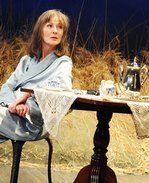SITE GUIDE
SEARCH
REVIEWS
REVIEW ARCHIVES
ADVERTISING AT CURTAINUP
FEATURES
NEWS
Etcetera and
Short Term Listings
LISTINGS
Broadway
Off-Broadway
NYC Restaurants
BOOKS and CDs
OTHER PLACES
Berkshires
London
California
New Jersey
DC
Connecticut
Philadelphia
Elsewhere
QUOTES
TKTS
PLAYWRIGHTS' ALBUMS
LETTERS TO EDITOR
FILM
LINKS
MISCELLANEOUS
Free Updates
Masthead
Writing for Us
A CurtainUp  London Review
London Review
 London Review
London ReviewGreta Garbo Comes to Donegal
|
I'm an Irishwoman. I have no superiors — Colette
Who does she think she is? — Sir Matthew
Joan Crawford! — Greta Garbo
|

Caroline Lagerfelt as Greta Garbo (Tristram Kenton) |
Brought down in the world, the Hennessys now are employed as servants by the Englishman painter who bought their family home when they were forced to sell because of debt. In 1967, Northern Ireland was about to erupt as a battlefield and there have to be parallels between the occupation by the British and the English painter's purchase of the Hennessey house. McGuinness's plays are richly textured with strong, outspoken women characters who always remain in your imagination long after seeing the plays. The interesting thing about Greta Garbo Comes to Donegal is that the Irish woman can give the fabled, idiosyncratic Swedish actress a run for her money.
Michelle Fairley plays Paulie Hennessy, spinster and housekeeper to artist Sir Matthew Dover (Daniel Gerroll) and aunt to Colette (Lisa Diveney) who is hoping to go to university in Dublin to study medicine. Colette's father is James (Owen McDonnell), Paulie's brother and odd job man/chauffeur to Mr Dover. Her mother Sylvia (Angeline Ball), who originates from Derry, helps with the laundry and in the house. Colette's parents squabble incessantly and bitterly, each blaming the other: Sylvia blames James for drinking away the fortune and James blames Sylvia for spending it.
;Garbo is visiting ostensibly to look at the possibility of purchasing the house and grounds but also because Sir Matthew wants to paint her portrait. When Sir Matthew's young lover Harry Caulfield (Tom McKay) appears provocatively naked in Paulie's kitchen, she admonishes him with "Don't you go shaking that contraption at me!" Things come to a head when Colette passes her exams with distinction and has won a place at medical school which her parents cannot afford to pay for.
Although she forms the subject of the title, McGuinness's play is less about Greta Garbo as a character, than her impact on the Hennessys. We do, however, get glimpses of Garbos's whimsical and erratic contrariness, like royalty used to being pandered to. There is some biographical information which Garbo (Caroline Lagerfelt) shares with Paulie about her family but Greta Garbo is essentially private — she doesn't want people to look inside her, just at her. The love interest of the play is the under the surface relationship between Paulie and Garbo as the two women explore common ground. McGuinness handles this attraction and developing intimacy superbly, making it subtle and yet deep.
Robert Jones' set is beautiful — field edges of long grass turned golden, dried out by the sun, a path on a slope up to the suggestion of a blue painted house with a grand door. The cast gather round the kitchen table but it's out of doors. Matthew Eagland's lighting adds to this picture of rural Ireland. Garbo wears men's brogues and clothes with more than a hint of masculinity.
Nicolas Kent has drawn memorable performances from his cast. Michelle Fairley as Paulie is the salt of the earth, someone who works hard for everyone with little acknowledgement but holding the family together. Her sister in law Sylvia, played by Angeline Ball, obviously once very pretty, becomes more unpleasant and viciously selfish as the play progresses. Lisa Diveney as Colette has some hard decisions for an eighteen year old. Daniel Gerroll is sometimes arrogant and supercilious as the English landowner artist in Ireland. This play is also about money and power. Caroline Lagerfelt seems the weak link as Garbo, but it may be deliberate that McGuinness wants the actress not to dominate his play and to be more mundane than her enigmatic screen persona.
Frank McGuinness has written another extraordinarily, tightly observed analysis of family dynamics and dysfunction highlighted by the arrival of the wandering star but unlike many modern playwrights, his characters are sympathetic, likeable and as are we all, flawed. It is a joy to watch the beautifully written Greta Garbo Comes to Donegal, a super production of a first rate family centred drama.
|
Subscribe to our FREE email updates with a note from editor Elyse Sommer about additions to the website -- with main page hot links to the latest features posted at our numerous locations. To subscribe,
E-mail: esommer@curtainup.comesommer@curtainup.com
put SUBSCRIBE CURTAINUP EMAIL UPDATE in the subject line and your full name and email address in the body of the message -- if you can spare a minute, tell us how you came to CurtainUp and from what part of the country. |
| Greta Garbo Comes to Donegal
Written by Frank McGuinness Directed by Nicolas Kent Starring: Michelle Fairley With: Lisa Diveney, Angeline Ball, Tom McKay, Owen McDonnell, Daniel Gerroll, Caroline Lagerfelt Sound: Tom Lishman Design: Robert Jones Lighting: Matthew Eagland Running time: Two hours 40 minutes with one interval Box Office: 020 7328 1000 Booking to 20th February 2010 Reviewed by Lizzie Loveridge based on 11th January 2010 performance at the Tricycle Theatre, Kilburn High Road, London NW6 (Tube: Kilburn) |
|
REVIEW FEEDBACK Highlight one of the responses below and click "copy" or"CTRL+C"
Paste the highlighted text into the subject line (CTRL+ V): Feel free to add detailed comments in the body of the email . . . also the names and emails of any friends to whom you'd like us to forward a copy of this review. |
|
London Theatre Tickets Lion King Tickets Billy Elliot Tickets Mighty Boosh Tickets Mamma Mia Tickets We Will Rock You Tickets Theatre Tickets |




